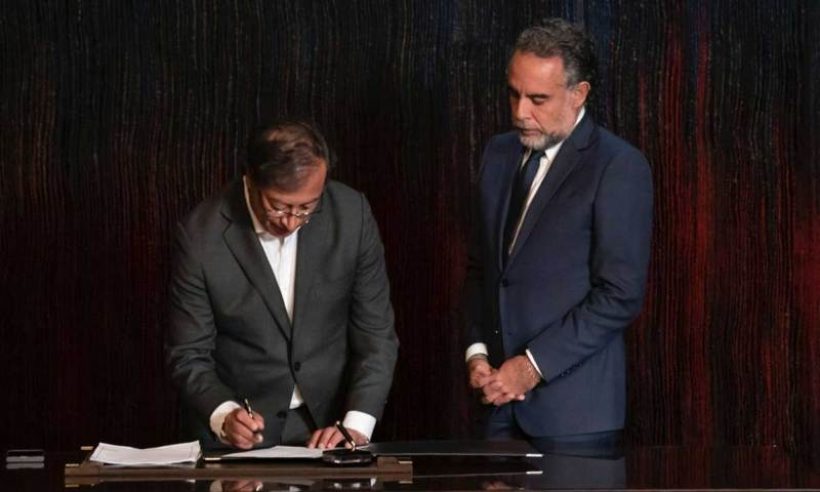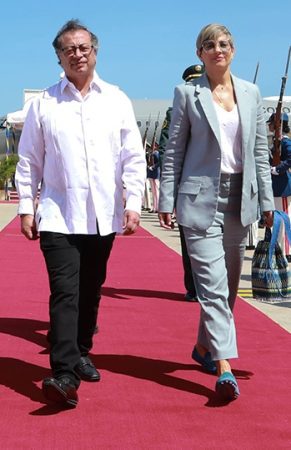Breaking News: US Treasury Imposes OFAC Sanctions On Colombian President Gustavo Petro, Family & Armando Benedetti
The US Department of the Treasury’s Office of Foreign Assets Control (OFAC) today placed sitting Colombian President Gustavo Petro on its Specially Designated Nationals and Blocked Persons (SDN) List. The action, taken pursuant to Executive Order 14059, which targets foreign persons involved in the international proliferation of illicit drugs, marks an un precedented escalation in sanctions policy against a head of state from a key US ally in the region.
The designations signal a formal determination by the US Treasury Department that these individuals have materially contributed to, or pose a significant risk of materially contributing to, the global illicit drug trade. The action was announced in a Treasury press release detailing the sanctions against the President and his support network, and comes as an escalation in the public spat between Petro and US President Donald Trump.
The Scope of the Designations
The individuals added to the SDN List include:
- PETRO URREGO, Gustavo Francisco (DOB 19 Apr 1960), President of Colombia, designated under the counternarcotics authority of Executive Order 14059.
- ALCOCER GARCIA, Verónica del Socorro (DOB 26 May 1976), President Petro’s wife, designated as linked to Gustavo Francisco Petro Urrego.
- PETRO BURGOS, Nicolás Fernando (DOB 21 Jun 1986), President Petro’s son, designated as linked to Gustavo Francisco Petro Urrego.
- BENEDETTI VILLANEDA, Armando Alberto (DOB 29 Aug 1967), a former diplomat and high-ranking Colombian official, designated as linked to Gustavo Francisco Petro Urrego.
The designations effectively place the individuals in a restrictive financial status typically reserved for terrorists, international criminals, and officials of sanctioned regimes.
The President’s son, Nicolás Petro is already on trial in Colombia by Colombian prosecutors for corruption and dealings with narcotraffickers. Even with his father as president, he has been able to avoid arrest and detention, with his jilted wife, Daysuris Vasquez, serving as a key witness against him.
Petro’s Interior Minister and primary political consigliere, Armando Benedetti has also been sanctioned. Petro’s own former Foreign Minister, Alvaro Leyva has publicly accused the president of being a cocaine addict, while Benedetti has openly admitted that he is a recovering cocaine and alcohol addict.
Immediate Financial and Legal Implications
The designation to the SDN List carries defined and severe consequences under US law, primarily centered on financial blocking:
The sanctions imposed on Petro, his family, & Benedetti are commonly known as being added to “the Clinton List.”
- Asset Blocking: All property and interests in property of the four designated individuals that are within US jurisdiction, or that come within the possession or control of any US person, are immediately blocked (frozen). This requires US financial institutions and entities to report the blockage of funds, real estate, securities, or other assets to OFAC.
- Transaction Prohibition: US persons—a category that includes US citizens and permanent residents, entities organized under US laws (and their foreign branches), and any person located within the United States—are prohibited from engaging in any transaction or dealing with the designated individuals. This prohibition extends to making or receiving any contribution or provision of funds, goods, or services to or for the benefit of an SDN.
- The 50 Percent Rule: Any entity owned, directly or indirectly, 50% or more by one or more of the designated individuals is also considered blocked, regardless of whether that entity is explicitly named on the SDN List.
Furthermore, the names are integrated into global compliance screening databases used by most international banks and financial institutions. This development is expected to isolate the designated individuals from the global financial system, making routine actions such as international wire transfers, opening bank accounts, and using credit services highly problematic or impossible.
Impact on Petro’s Future
The SDN designations carry different risks based on the current and future governmental status of the designated officials.
Current Term (Until August 2026)

President Gustavo Petro posing for a photo with his son Nicolás Petro. (Credit: Presidencia de la Republica)
While President Petro holds his position, official governmental dealings between the US and Colombia may continue, potentially protected by principles of sovereign immunity. However, the designation is applied to him as an individual for illicit activities, not in his capacity as head of state.
- Official Duties: US government agencies and diplomats are restricted from conducting personal or financial transactions with the President, which complicates interactions beyond the necessary official capacity.
- Personal Finances: Any personal US-based assets the four individuals may have are blocked. Their personal finances and travel outside of Colombia become subject to severe scrutiny, as non-US financial institutions that engage in transactions with him risk being targeted by secondary sanctions.
- Previous Visa Status: This financial sanction follows a previous action where President Petro’s US visa was revoked earlier this year after he called on the US military to rebel while participating in a pro-Palestine protest in New York. The SDN designation solidifies his inability to travel to the United States and extends the US financial prohibition globally.
- Petro’s wife, son, and Armando Alberto Benedetti face the full immediate weight of the financial sanctions, including total blocking of any US assets and prohibition of transactions with US persons.
Post Presidency
When President Petro’s term ends in August 2026, he and his family will lose any residual protections or considerations afforded by his presidential office.
- Total Isolation: The post-term status is expected to result in complete global financial isolation for all four individuals. Without the shield of public office, any attempt to conduct legitimate business, investment, or banking internationally would be flagged and rejected by compliance systems worldwide due to the fear of secondary sanctions against foreign entities.
- Legal Exposure: The designations are intended to prevent the designated individuals from utilizing the international financial system. Any attempt by the sanctioned persons to circumvent these restrictions after leaving office could result in further investigations and potential criminal charges by US authorities.
Update: Dueling official statements
Friday afternoon, the Colombian & US governments issued the following diplomatic statements (Colombian statement translated to English by Finance Colombia):
US Department of State
U.S. Decision Not to Certify Colombia’s Counternarcotics Efforts and Sanctions Actions Against Colombian Officials Involved in Global Illicit Drug Trade
Due to President Gustavo Petro’s disastrous and ineffective counternarcotics policies, Secretary of State Marco Rubio will not certify Colombia under the criteria of the Department of State, Foreign Operations, and Related Programs Appropriations Act, 2024, as carried forward by the Full-Year Continuing Appropriations Act, 2025. President Trump made it clear in his September 15 determination [on Major Drug Transit or Major Illicit Drug Producing Countries for Fiscal Year 2026] that Colombia is “failing demonstrably” to uphold its drug control responsibilities. Petro has since doubled down in defense of his failed policies.
The United States will not turn a blind eye to Petro’s appeasement and emboldening of narco-terrorists. We are committed to bringing terrorists and drug traffickers to justice and preventing deadly illegal drugs from entering our country. There must be no impunity for drug traffickers or acts of terrorism or violence by criminal armed groups.
We remain steadfast in our support for Colombian security forces, its justice sector, and departmental and municipal officials, and we will continue to partner with them in our joint efforts to combat drug trafficking. Today’s decision is not a reflection on these institutions but rather the failures and incompetence of Gustavo Petro and his inner circle.
In addition to today’s announcement of the decision not to certify Colombia, the United States, through the Department of the Treasury’s Office of Foreign Assets Control (“OFAC”), is sanctioning four Colombian nationals, including President Gustavo Petro, Petro’s wife Veronica, his son Nicolás, and Minister of Interior Armando Benedetti for their involvement in the global illicit drug trade. Narcotics trafficking and narcoterrorism continues to fuel violence, corruption, and instability in Colombia, while also posing significant challenges to regional and international security.
Today’s announcement concerns a decision not to certify Colombia for certain FY2025 assistance under section 7045(c)(3)(A) of the Department of State, Foreign Operations, and Related Programs Appropriations Act, 2024 (Div. F, P.L. 118-47), as carried forward by the Full-Year Continuing Appropriations Act, 2025 (Div. A, P.L. 119-4). Today’s designation actions were taken pursuant to Executive Order (E.O.) 14059, which targets the international proliferation of illicit drugs and their means of production. For more information about today’s designations, please see Treasury’s press release.
Colombia Ministry of Foreign Affairs (Cancillería)
The Colombian Foreign Ministry once again rejects the unfriendly actions of the United States.
The Ministry of Foreign Affairs expresses its strong rejection of the inclusion of the President of the Republic of Colombia, Gustavo Petro Urrego, his family, and the Minister of the Interior, Armando Benedetti, on the List of Specially Designated Nationals, updated today by the Office of Foreign Assets Control (OFAC) of the United States Department of the Treasury. This decision is completely unfounded and constitutes an affront to the President of Colombia, the highest administrative authority and Supreme Commander-in-Chief of the Armed Forces, and to the entire Colombian people.
The Colombian Ministry of Foreign Affairs also condemns the offensive and outrageous statements made by Scott Bessent, Secretary of the Treasury of the United States, against the Colombian President, which also constitute an insult to someone who has maintained a frontal and tireless fight against drug trafficking for more than three decades, and who has achieved during his administration the largest seizures of illicit drugs in recent history, thanks to a policy defined by him and under his orders as Commander-in-Chief of the Public Force, aimed at comprehensively combating the scourge of drugs.
The OFAC decision and the insulting treatment the President has received in recent days violate not only his honor, but also the memory of the thousands of Colombians who have sacrificed their lives in the fight against drug trafficking.
These hostile acts, which not only insult but also disregard the fight against drug trafficking waged by President Gustavo Petro Urrego, the Armed Forces, and Colombian society, do nothing to normalize diplomatic relations between the two countries.
For Colombia, the strategic relationship with the United States is governed by a vision of the State, independent of the current political cycles of each country, and is based on the close economic, social, and cultural ties built over more than two centuries of collaborative work. The Colombian people expect the United States government to value and respect its relationship with Colombia in the same way other nations do with our country.
Headline image: Colombian President Gustavo Petro (left) with Interior Minister Armando Benedetti (photo: Presidency of Colombia)
























